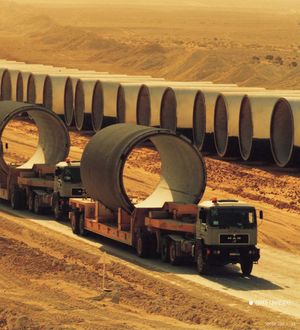The Korean Construction Industry Goes to the Middle East
The first oil crisis of 1973 was a blow to the South Korean economy, as quadrupling the oil price doubled the prices of any products in Korea's domestic market. Global stagnation resulted in the decrease of Korean exports, and soaring payments due for the crude oil was followed by a currency exchange crisis. In contrast, OPEC countries were making massive investments to build-up their economy and infrastructures such as roads, harbor, and airports from their amassment of oil money.
Hence, the South Korean government came up with an idea to retrieve the dollar-drainage through commissioning construction enterprises in the Middle East. Just in time, the Samhwan Corporation signed a contract for the construction of an expressway in Saudi Arabia for 24 million USD. The Korean government's strategy was proven effective, turning the crisis into an opportunity. By successfully retrieving oil money through construction projects in the Middle East, South Korea overcame the economic crisis and accumulated capital to support the rapid economic growth of the 1980s and 1990s.
At the early stage, South Korean construction companies started off as subcontractors of the major, global companies who directed the overall projects. But the Koreans gradually developed their own reputation and technology to become capable of directing large-scale construction projects on their own. The South Korean government took an active part to assist their entrepreneurs overseas.
In 1974, the first year Koreans entered the Middle Eastern construction market, Korean companies earned a total of 260 million USD. By 1981, the total revenue South Korea earned from overseas construction projects amounted to 13.7 billion USD. The number of the overseas workers also increased significantly, from 6,000 in 1975 to 100,000 in 1978. The local investors considered Korean workers disciplined, hard-working, high-achieving, and highly reliable.
Overseas construction projects yield higher rates of foreign exchange earnings due to the fact that they do not induce an import increase. In addition, the average wage paid to the Korean workers was lower than the international standards. More Koreans were employed for the projects, resulting in both the profits from the construction as well as the labor costs returned to Korea.
The Korean economy, which suffered a recession from the oil crisis, was revitalized by the oil money earned from the construction market in the Middle East. Furthermore, its companies gained international reputation and developed into global construction companies from their experiences working on highly-technical and challenging construction projects in the Middle East. Today, South Korean construction companies are winning multi-billion dollar commissions around the world, especially in Southeast Asia, based on their successful experiences from the Middle Eastern market.
Related Articles
- The Name of Honor and Prosperity - The Republic of Korea (South Korea)
- South Korean
- Middle East
- Samhwan Corporation
- Saudi Arabia

